David Moyes: What went wrong and where now for Sunderland manager?
- Published
- comments
Moyes 'feels' for Sunderland fans after relegation
It was only four years ago that David Moyes was hand-picked by retiring Manchester United manager Sir Alex Ferguson to succeed him at Old Trafford after 26 years and 38 trophies - now his career and reputation has hit rock-bottom with relegation at Sunderland.
Moyes has endured a torrid and humiliating fall from grace after being deemed worthy of Ferguson's personal seal of approval to take on Manchester United in 2013 after 11 years of reliable and stable work at Everton.
The manager labelled "The Chosen One" on a banner draped from the Stretford End was out of his depth and sacked after 10 months, the end coming after a defeat at Everton that meant United would not qualify for the Champions League for the first time in 19 years.
Moyes moved abroad to restore his good managerial name but was sacked after a year at La Liga side Real Sociedad - and his return to the Premier League with Sunderland has been an unrelenting nightmare.
What went wrong at Sunderland?
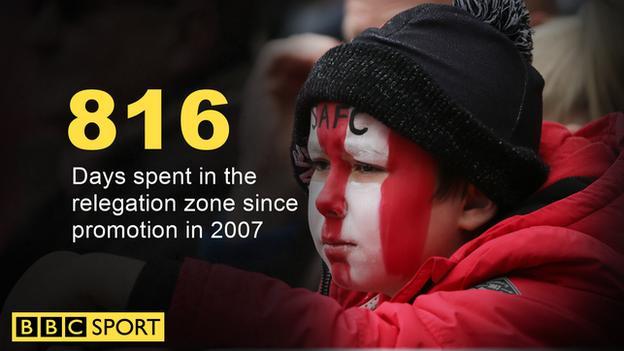
In the past 10 years, Sunderland have spent more time in the Premier League's bottom three than any other club. Wigan Athletic, on 590 days, are the nearest to them
Moyes was a well-received appointment at the Stadium Of Light in July in succession to Sam Allardyce, who rescued the Black Cats from relegation before his brief, inglorious reign as England manager.
The Scot was seen as a safe choice, a man with a point to prove after failures at United and Real Sociedad, and a manager boasting the sort of track record that suggested he was a decent fit to lift perennial Premier League strugglers.
At Everton, he was regarded as capable of getting a team to punch above its weight. Survival would have been seen as success at Sunderland, a situation seemingly suited to his instincts.
In 11 years at Goodison Park, Moyes had only finished outside the top 10 twice, guided Everton to fifth twice and defied the odds in remarkable fashion to take the Toffees into the Champions League qualifiers after finishing fourth in 2004-05.
Moyes, strangely in the eyes of some, departed without mourning among many Everton supporters who felt his attitude was too negative, not helped by a record that saw no Premier League away wins at Manchester United, Chelsea, Arsenal or Liverpool during his entire reign.
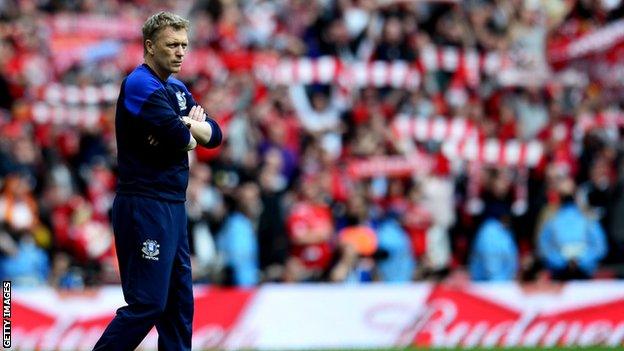
Everton were beaten 2-1 by an under-strength Liverpool team in the 2012 FA Cup semi-final at Wembley
He was also portrayed as a manager who came up short on the big occasions, the 2009 FA Cup final loss to Chelsea, the 2012 semi-final defeat by under-strength Liverpool at Wembley and a hapless 3-0 quarter-final loss to struggling Wigan Athletic at Goodison Park in 2013 being prime examples.
These perceived failings have been underscored by recent failures.
If Sunderland fans were looking for an upbeat message when Moyes arrived, they were to be sadly mistaken when he flagged up a season-long relegation fight after only his second game in charge, a 2-1 home loss to Middlesbrough.
Asked about supporters fearing a season-long struggle, he said: "Well, they would probably be right."
Realism is one thing - negativity and defeatism is another. This was a message that was badly received by Sunderland's fans and set the tone for a season that turned into a long, slow, painful, joyless march into the Championship.
It was also a message delivered with 10 days of the August transfer window remaining, hardly enticing words to potential new signings.
And, damningly, it became a self-fulfilling prophecy as Moyes was unable to do anything to defy his own ominous predictions for Sunderland's season.
The rot may well have already set in before Moyes uttered those ill-fated words but when fans and players looked to the new manager for leadership and inspiration, that would only have made matters worse. The Black Cats fans did not expect Moyes to reach for the stars but the cloak of conservatism was a poor fit.
Moyes was always regarded as cautious in the transfer market at Everton, which was perfectly understandable given the financial restraints he operated within. He knew if he spent and wasted precious transfer cash he was unlikely to get it back.
It saw him saddled with a "Dithering Davie" tag by some because of his desire to get every deal and detail right, and it was a nickname he knew all about.
Sunderland relegation a 'terrible' feeling
He could answer by outlining how his meticulous approach saw him bring bargain-priced gems to Goodison Park such as Tim Cahill for £2m from Millwall, Phil Jagielka for £4m from Sheffield United, Joleon Lescott from Wolves for £5m, Mikel Arteta for £2m from Real Sociedad - and the inspired signing of young Irish full-back Seamus Coleman from Sligo Rovers for only £60,000.
The Scot had lost that sure touch by the time he turned up at Sunderland.
Moyes was restricted by a relatively small transfer budget and an owner in Ellis Short who wants to sell the club, but his dealings smacked of conservatism and suggested he was not prepared to broaden his horizons beyond the familiar.
It led to accusations he was putting the old band back together from Everton as Steven Pienaar arrived from Goodison Park after being released following lengthy injury problems.
And the Everton old boys continued to pitch up, striker Victor Anichebe signed after being released by West Bromwich Albion, veteran defender Lescott after his contract was cancelled by AEK Athens and January's £8m double deal with the Merseyside club for Darron Gibson and Bryan Oviedo. None were a success.
Moyes would suggest it was simply the market he was forced to work in but the policy of going with what he knew failed dismally, while big-money signings such as £13.6m Didier Ndong from Lorient and Papy Djilobodji, signed for £8m after flopping at Chelsea, also failed to deliver.
As Sunderland took root at the foot of the Premier League, the toxic combination of apathy and anger set in and Moyes then made headlines for the wrong reasons when he reacted to a question from BBC reporter Vicki Sparks about the presence of owner Short at a game adding pressure by replying she "might get a slap, even though you're a woman."
On Wednesday Moyes was charged by the FA, citing his remarks as "improper and/or threatening and/or brought the game into disrepute".
Two sackings and a relegation on from his Old Trafford appointment, the Sunderland season is another black mark on his CV.
In defence of Moyes
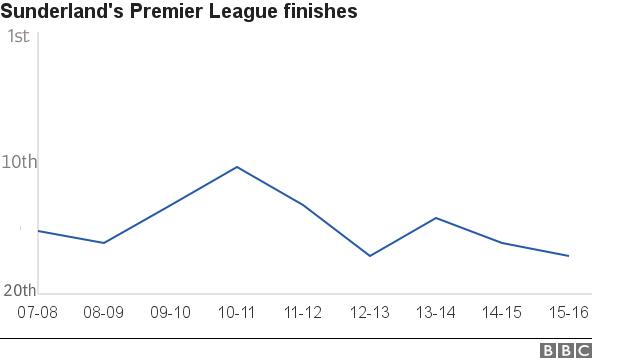
Sunderland last finished in the top 10 of the Premier League under Steve Bruce in 2010-11
Moyes is the manager who has taken Sunderland into the Championship - but wasn't someone going to do it eventually at a club suffering from diminishing returns and increasingly reduced circumstances?
Paolo Di Canio, Gus Poyet, Dick Advocaat and Sam Allardyce all had to engineer escapes from relegation as owner Short shuffled his managers to keep Sunderland in the Premier League.
Sunderland last finished in the top 10 (10th to be precise) under Steve Bruce in 2010-11. Since then it has been a miserable diet of struggle and mediocrity that has finally ended in the drop.
Were Sunderland right to stand by Moyes? | ||
|---|---|---|
2011-12 | Steve Bruce sacked, replaced by Martin O'Neill | Survived |
2012-13 | O'Neill sacked, replaced by Paolo di Canio | Survived |
2013-14 | Di Canio sacked, replaced by Gus Poyet | Survived |
2014-15 | Poyet sacked, replaced by Dick Advocaat | Survived |
2015-16 | Advocaat resigns, replaced by Sam Allardyce | Survived |
2016-17 | David Moyes replaces Allardyce before season | Relegated |
As Aston Villa eventually found out, there is only so long you can flirt with relegation before you end up in the full-blown embrace of the Championship.
Moyes has had to contend with a hierarchy whose desire to sell reduced ambition and created an air of resignation and stagnation. He, crucially, acted in a way that fell into line with that mood but others must also take responsibility for Sunderland's decline.
Sunderland were only going to get away with survival for so long barring a radical change of policy or new owners - many will see the consequences of that home defeat by Bournemouth as simply a price paid for years of mismanagement on and off the pitch.
Where now for 'damaged goods' Moyes?
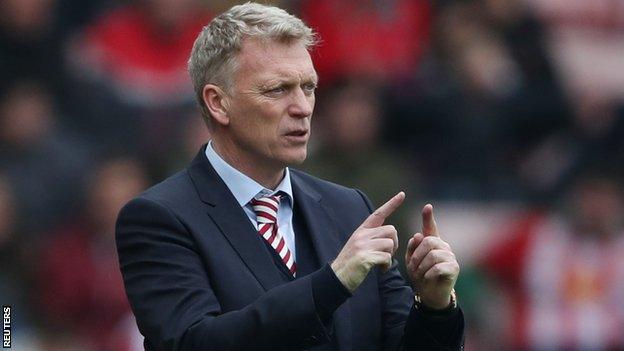
Sunderland have won only five league games this season
When Newcastle United were relegated at the end of last season, manager Rafael Benitez was regarded as blameless and the man who would take them back up. The Toon Army pleaded with him to stay and owner Mike Ashley to keep him.
Newcastle will now swap places with their rivals - but Moyes enjoys none of the goodwill and optimism showered on Benitez. Indeed, Sunderland's fans have turned on the manager they believe has appeared to publicly accept the Black Cats' fate for months.
It would be a very hard sell to Sunderland's fans to keep him in charge. The reputation won with his work at Everton has been eroded by failure in his three subsequent posts.
The Scot may well wish to stay in charge of Sunderland as a Championship club because that is likely to be as good as it now gets for a manager who was coveted throughout his time at Everton for shrewdness, stability and motivational acumen.
Moyes was linked with the Celtic vacancy, as he has been often before, last summer but Brendan Rodgers was eventually appointed and even the safety net of a move back to a big club in his native Scotland now looks to have passed him by.
In 427 league games at Everton, he won 173 for a win ratio of 40.5%. He won exactly half of his 34 league matches at Manchester United but at Sunderland he has only won five out of 34, just 14.7%.
Moyes regards himself as a fighter but this season he has looked worlds away from the fired-up, intense touchline operator who made his way at Preston North End and moved on to Everton.
He has looked world-weary, by-passed in the Premier League by a younger generation such as Eddie Howe at Bournemouth and Marco Silva at Hull City, a worn-down figure struggling to find the powers he could call upon in the past. He was once a symbol of that emerging group but his recent record makes him damaged goods.
Moyes could not rouse his players and looked to be struggling to rouse himself. Has he got the desire to try and rebuild Sunderland and his own reputation from the lower divisions?
Leon Osman, a stalwart of his Everton dressing room during his years at Goodison Park, made a telling observation as he remarked to BBC Radio 5 live after the midweek loss at Middlesbrough: "He even sounds resigned and defeated in his voice at the moment.
"I have worked with him when he had a lot of fire in his belly and you could see it in his eyes. A caller has told us he was sitting down and letting Robbie Stockdale do the talking.
"When I played under him, David Moyes was the one on the sidelines. David Moyes was the one with his eyes popping out of his head, screaming and pointing at you. At the moment he seems to be taking a backward step."
Moyes was hurt by his failure, and indeed his treatment, at Old Trafford when a six-year contract was cut spectacularly short. He was unsuccessful in his short-lived move to Spain and now has suffered the ignominy of relegation.
Have the fires of passion that drove him before the torture of his time at Manchester United been extinguished? Is the 54-year-old suddenly a manager out of his time, still reliant on tried and trusted methods and a transfer strategy that have been overtaken?
Moyes is a proud manager who stands by his record throughout his career, despite the recent downturn.
He is now, however, a manager who must rebuild his badly damaged stature in the Championship - if he gets the chance. The fall from grace is complete.
- Published29 April 2017
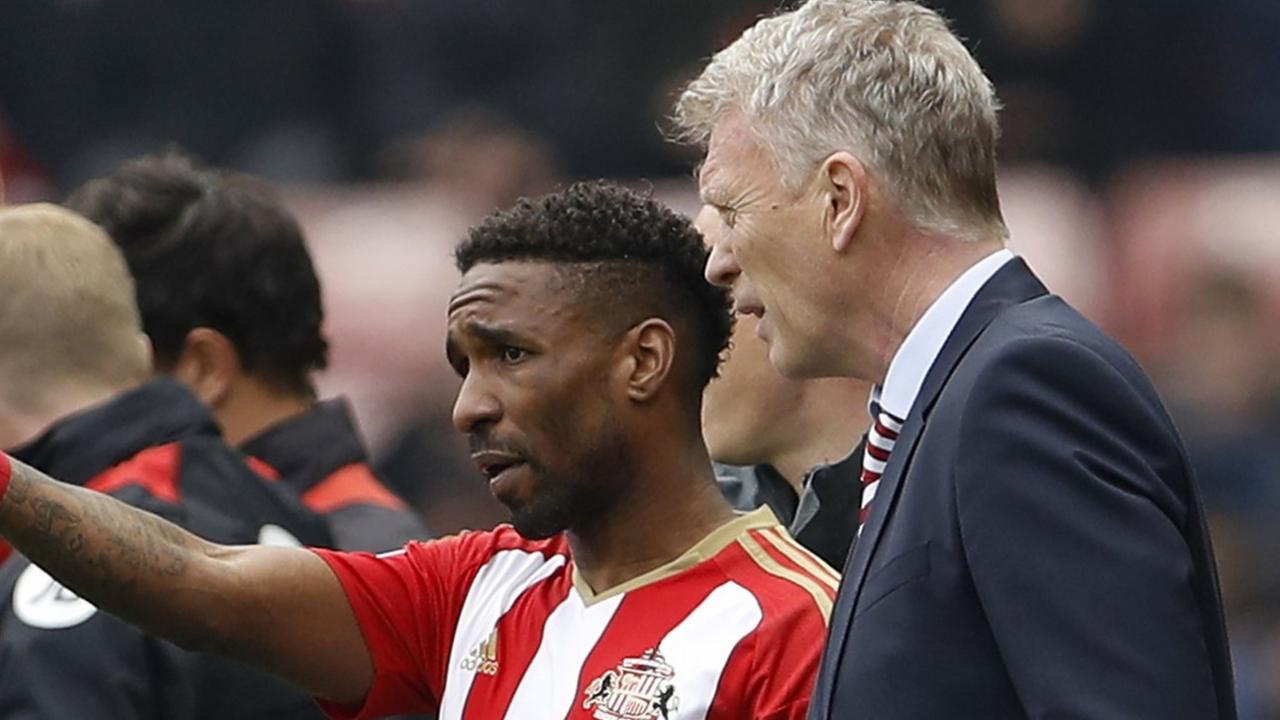
- Published29 April 2017
